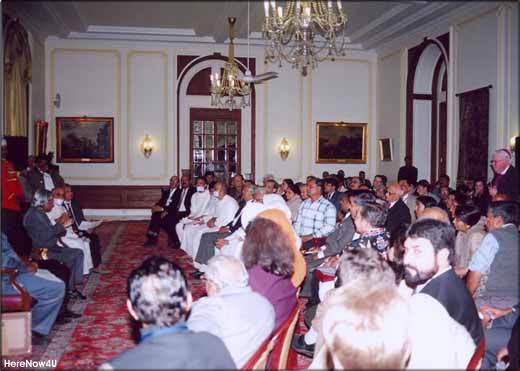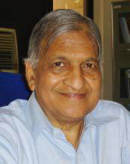
The session was followed by a special interaction of delegates with H.E, the President of India Dr. APJ Abdul Kalam at Rashtrapati Bhawan

Delegates with the President of India in President's house
Prof. Muni Mahendrakumarji initiated the interaction with the President of India, Dr. A.P.J. Abdul Kalam by introducing the theme of the First International Conference titled “Economics of Non-Violence and the Vision of a Sustainable World”.
He affirmed that the deliberations were intended towards producing a new world order, based on economics and blended with non-violence. The conference was inaugurated by Acharya Mahapragyaji and an address by him set the tone for deliberations. The conference could be deemed as a prelude to a bigger dream, that is, the vision of a sustainable world. Muni Mahendrakumarji hoped that Dr. Kalam and Acharya Mahapragyaji could jointly be the harbinger of a peaceful, tranquil, humane and sustainable world devoid of discriminations and disparities. However, with these two peace pilgrims guiding us, it cannot be presumed that an individual's responsibility is reduced in anyway. We need to pledge ourselves to non-violence and aparigraha. All should work together in order to usher into the long aspired, much cherished abode of harmony.
Dr. Ashok Bapna, Organizing General Secretary of the Conference and Director, IILM-AHL, Jaipur presented the first copy of the report on "Humane Development" to the President and requested him to address the gathering.
The President extended greetings to the national and international delegates. He was glad that they had met Acharya Mahapragya and had a feel of his thoughts on world peace. He asserted that we are all striving for a peaceful, prosperous and a safe world. These are not disparate goals; rather all blend together and complement each other. We ought to give our children, a youth of 6 billion in its entirety, a peaceful world, lest they should revolt and work for it. No government can create this because it is the same as creating a hope. The responsibility to create enlightened and responsible citizens vests with the parents. If they fail in the conscientious discharge of their responsibility, the nation fails. We need to have a society that is aware of its responsibilities.
He firmly believes, based on his experience of interviews with nine hundred thousand children, that up to the age of 17 years a child is corrigible and can be reformed. He's docile, pliant and flexible. Beyond this age, the task becomes daunting.
The important question before us was, how do we then creates an enlightened citizen? Dr. Kalam postulated a three dimensional framework or model, which he has shared with Acharya Mahapragyaji, too.
Inculcating the value system in the child by introducing the Education Value System.
Going back to the year 1945, the President said that the UN was formed with a mission to prevent any conflict culminating into a war. The idea was to find a quick resolution of the conflicts so that they do not escalate into a war like situation. Unfortunately, the UN failed miserably in achieving its solemn aim and the world has witnessed many wars and war-like situations. This necessitates having a world body like the UNESCO, supervising and integrating the educational value system across all parts of the globe.
Education can well achieve this because a child on an average spends 12 years of his influential life in school. This amounts to approximately 25,000 hours. India is blessed with a powerful institution in the form of a joint family system where the grand parents inject the best traditional values in the child. The spiritual education laden with values up to the secondary education level is inevitably needed.
 Dr. Ashok Bapna
Dr. Ashok Bapna